广州专用(沪教牛津版)八年级英语上册主要知识点
广州牛津版八年级上册英语每单元语法总结
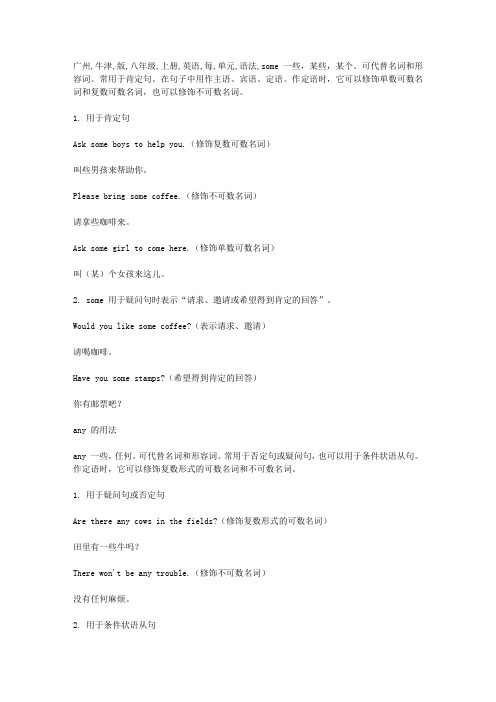
广州,牛津,版,八年级,上册,英语,每,单元,语法,some 一些,某些,某个。
可代替名词和形容词。
常用于肯定句。
在句子中用作主语、宾语、定语。
作定语时,它可以修饰单数可数名词和复数可数名词,也可以修饰不可数名词。
1. 用于肯定句Ask some boys to help you.(修饰复数可数名词)叫些男孩来帮助你。
Please bring some coffee.(修饰不可数名词)请拿些咖啡来。
Ask some girl to come here.(修饰单数可数名词)叫(某)个女孩来这儿。
2. some 用于疑问句时表示“请求、邀请或希望得到肯定的回答”。
Would you like some coffee?(表示请求、邀请)请喝咖啡。
Have you some stamps?(希望得到肯定的回答)你有邮票吧?any 的用法any 一些,任何。
可代替名词和形容词。
常用于否定句或疑问句,也可以用于条件状语从句。
作定语时,它可以修饰复数形式的可数名词和不可数名词。
1. 用于疑问句或否定句Are there any cows in the fields?(修饰复数形式的可数名词)田里有一些牛吗?There won't be any trouble.(修饰不可数名词)没有任何麻烦。
2. 用于条件状语从句If there is any trouble, let me know.如果有什么麻烦,要让我知道。
3. any 用于肯定句时,通常要重读,修饰单数可数名词和不可数名词。
Any time you want me, just send for me.什么时候你需要我,随时叫我来。
Come any day you like.只要你喜欢,随时可以来。
( ) 4 There is not ___ meat in my bowl. There is ____ chicken in it.A. some; anyB. any; someC. any; anyD. some; some( ) 5 -I have forgotten my bread.-Never mind, you can have____.A. some of usB. some of ourC. some of oursD. many of ours( ) 6 -Is there ___ tea in' that green cup?-Yes, there is____.A. the; someB. any; anyC. some; anyD. any; some( ) 1 Could you do___for me, please?g C. something D. anything( ) 2 The bottle is empty. There is___ in it.A. anythingB. somethingC. nothingD. everything( ) 3 -Turn off the TV, Betty. ____ is watching it.-Oh, no. Mum. I'm watching it now.A. somebodyB. NobodyC. EverybodyD. Anybody( ) 4 -Did you find ___ in the room?-No, we found ___ there.A. anybody; nobodyB. somebody; everybodyC. anybody; somebodyD. everybody; anybody( ) 5 I have a lot of work to do. 1 have___ time to play.A. notB. anyC. noD. some( ) 6 As we know, he is___fool.A. notB. no aC. not anD. No( ) 1 I asked him for some oil, but he hadn't ___.A. someB. anyC. anythingD. no( ) 2 ___ of the four roads will take you to the hospital.A. NeitherB. EitherC. BothD. Any( ) 3 Would you lend me of your money? "A. someB. lotC. a fewD. any( ) 4 Would you like___more coffee?A. littleB. anyC. someD. another( ) 5 -Have you any books on radio?-I'd like to borrow ___.A. thoseB. someC. themD. it( ) 1 Listen to me. I have____ to tell you.A. anything newB. something newC. new somethingD. nothing new ( ) 2 By the way, is there ____ in today's newspaper?A. something new oB. anything newC. new somethingD. new anything ( ) 3 Please be quiet. I have___ to tell you.A. important somethingB. nothing importantC. important anythingD. something important( ) 4 I'm not busy. I haven't ____ to do.A. somethingB. everythingC. nothingD. anything( ) 5 ____ has happened, I want you to tell me about it.A. SomethingB. EverythingC. AnythingD. Nothing( ) 1 Yesterday morning ___ boy broke into the garden.A. anyB. someC. manyD. much( ) 2 ___ twenty boys were playing football at that time yesterday.A. EachB. SomeC. No oneD. Neither( ) 3 Now I have ______ questions. Let's go to ask our teacher.A. anyB. muchC. someD. a lot( ) 1 If you like these apples, you can take_____.A. anyB. a lotC. that .D. this( ) 2 I will do____for my motherland.A. anythingB. manyC. muchD. something( ) 3 -Did they find ___ in the park?-No, they found____there.A. anybody; nobodyB. somebody; everybodyC. anybody; somebodyD. everybody; anybody( ) 1 I don't know_____ of these people, for they are new workers.A. anyB. someC. oneD. much( ) 2 He didn't take ___ one. They are all here.A. manyB. anyC. a littleD. That比较级的构成一、形容词级的构成1. 单音节形容词的比较级以及以-ly, -er, -ow结尾的形容词在词尾加-er;以e结尾的形容词在词尾直接加-r构成,重读闭音节双写末位字母再加er。
广州专用(沪教牛津版)八年级英语上册主要知识点(完整资料).doc

【最新整理,下载后即可编辑】广州八年级英语(上册)主要知识点Unit 1 Newspaperseful phrases and expressions Take charge of 主管,掌管Vote for …投赞成票Take note 记录Be responsible for 负责,有责任Talk ....over 详谈Make a list of .....把…列成清单Be free for (someone) 对(某人)免费Pay....for 付费Make a decision about.... 对…作出决定In one week's time 一周后A copy of 一份For free 免费From the air 从空中Of one's own 某人自己的Have the habit of.... 有…的习惯Try one's best 尽力Try to (do something) 尽力(做某事)Try doing something 尝试做某事Believe in oneself 相信自己Once a week 每周一次Be pleased with.... 对…满意Keep fit 保持健康Have a high fever 发高烧At break 课间休息Not at all 一点也不,完全不Get on well 相处得好For this reason 因为这样2.语法language: should and ought to (positive)should not and ought not to (negative)3.辨析3.1O ther, the other, another(1) Other 表示泛指,没有特定的范围。
E.g. Lei Feng always helped other people.(2) The other 意为“另一个”,一般用于两者之间。
沪教牛津版初中英语八上教材短语句型知识点汇总

Unit 1 Encyclopaedias读:读两篇摘自一本百科全书的短文。
听:听一个关于“真人百科全书”的广播节目。
语法:学习如何使用some和any。
学习如何使用somebody, anybody,nobdy等词。
说:学习重读句子中的重要单词。
谈论来自一本百科全书的有趣的人或事。
写:完成一个关于小恐龙的小故事。
A.短语归纳1.be born 出生give birth to 生(孩子)2.in the countryside/village 在乡村in the city 在城市3.around the world 全世界all over the world4.for example 例如such as5.more than 多于less than 少于6.human being 人类human7.die out 消失;灭绝8.see the doctorgo to the doctor (去)看医生go to see the doctor9.at the end of 在……末端/尽头by the end of 到……末为止in the end 最后,终于10.be famous for 以……而闻名be famous as 作为……而出名11.some…others… 一些……另一些12.find out 了解;弄清楚13.go for a walk 去散步take/have a walk14.next to=beside 紧挨着;在……旁边15.look like 看起来像……16.break open 破开;裂开break up 打碎;破碎break down 分解;发生故障17.in the centre of… 在……中心18.one day 一天,(将来)某一天some day 总有一天;将来某一天19.learn…from… 从……中学会;向……学习……20.learn about 了解;学到关于……的内容21.be made in+ 地点在某地制造22. a type/kind of… 一种……23.be important to sb. 对某人很重要24.consist of… 由……组成25.be made up of…26.on Earth 在地球上27.by the window 在窗户旁边28. a week later 一周后B.句型归纳1.many+ 可数名词复数许多……much+不可数名词大量……2.like to do sth. 喜欢做某事like doing sth. 喜欢做某事ed to do sth. 过去常常做某事be used to doing sth. 习惯于做某事4.help sb. (to) do sth. 帮助某人做某事help sb. with sth.5.remember to do sth. 记着要做某事remember doing sth. 记得做过某事6.so much+ 不可数名词如此多的……7.make sb. do sth. 使/让某人做某事8. a number of+可数名词复数许多,大量(作主语时,谓语动词用复数)the number of+可数名词复数……的数量(作主语时,谓语动词用单数)9.it+be+adj.(for/of sb.)+to do sth. 做某事(对某人来说)是……的10.as+形容词/副词原形+as 与……一样……11.would like to do sth.want to do sth. 想要做某事feel like doing sth.12.be sure(that)+从句确定C.语法1.some和any2.复合不定代词由some, any, no, every分别与one, thing和body组合即可得到复合不定代词读:读一个关于数字的故事。
广州沪教牛津版八年级上册英语Unit 2 Numbers--基数词和序数词知识点总结
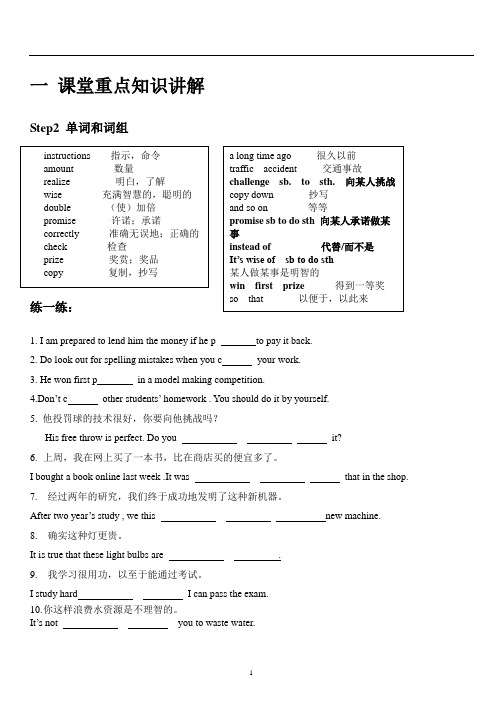
一 课堂重点知识讲解Step2 单词和词组练一练:1. I am prepared to lend him the money if he p to pay it back.2. Do look out for spelling mistakes when you c your work.3. He won first p in a model making competition.4.Don ’t c other students ’ homework . You should do it by yourself.5. 他投罚球的技术很好,你要向他挑战吗?His free throw is perfect. Do you it? 6. 上周,我在网上买了一本书,比在商店买的便宜多了。
I bought a book online last week .It wasthat in the shop. 7. 经过两年的研究,我们终于成功地发明了这种新机器。
After two year ’s study , we this new machine. 8. 确实这种灯更贵。
It is true that these light bulbs are . 9. 我学习很用功,以至于能通过考试。
I study hard I can pass the exam. 10. 你这样浪费水资源是不理智的。
It ’s not you to waste water.Step 2 基数词1.基数词的读法.1)1---12 : one two three four five six seven eight nine ten eleven twelve2)13---19: 词尾加-teen :thirteen fourteen fifteen sixteen seventeen eighteen nineteen3)20,30,40,50,60,70,80,90 : 逢十词尾加-ty :twenty thirty forty fifty sixty seventy eighty ninety4)21----99: 在十位与个位之间加连字符.21--- twenty-one 99---ninety-nine5)101---999 :先说几百, 再加and ,再加末尾两位数或个位数.101---one hundred and one 238----two hundred and thirty-eight6)1000以上的数:先将数字从右往左数,每三位数用一个逗号隔开, 从右往左第一个逗号表示“千”读thousand 第二个逗号表示“百万”读million 第三个逗号表示“十亿”读billion18,657,421---eighteen million ,six hundred and fifty-seven thousand ,four hundred and twenty-one.关于岁数的表达,例如two years old和two-year-old只可以做表语意思是两岁。
广州专用(沪教牛津版)八年级英语上册主要知识点教学教材
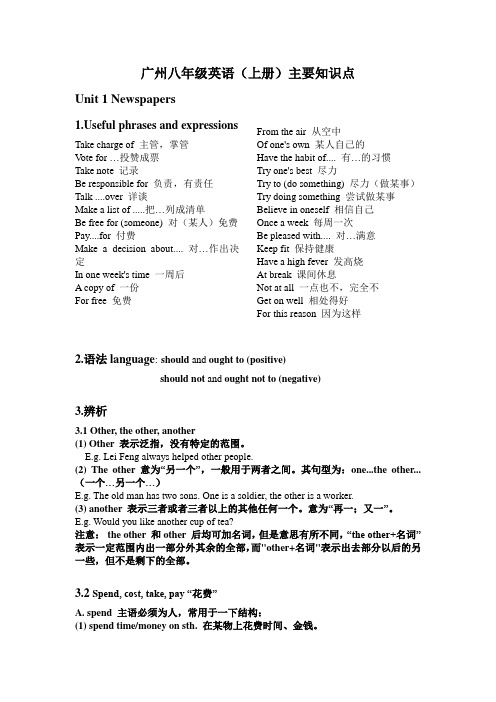
广州八年级英语(上册)主要知识点Unit 1 Newspaperseful phrases and expressions Take charge of 主管,掌管V ote for …投赞成票Take note 记录Be responsible for 负责,有责任Talk ....over 详谈Make a list of .....把…列成清单Be free for (someone) 对(某人)免费Pay....for 付费Make a decision about.... 对…作出决定In one week's time 一周后A copy of 一份For free 免费From the air 从空中Of one's own 某人自己的Have the habit of.... 有…的习惯Try one's best 尽力Try to (do something) 尽力(做某事)Try doing something 尝试做某事Believe in oneself 相信自己Once a week 每周一次Be pleased with.... 对…满意Keep fit 保持健康Have a high fever 发高烧At break 课间休息Not at all 一点也不,完全不Get on well 相处得好For this reason 因为这样2.语法language: should and ought to (positive)should not and ought not to (negative)3.辨析3.1Other, the other, another(1) Other 表示泛指,没有特定的范围。
E.g. Lei Feng always helped other people.(2) The other 意为“另一个”,一般用于两者之间。
沪教牛津版八年级上册英语教材
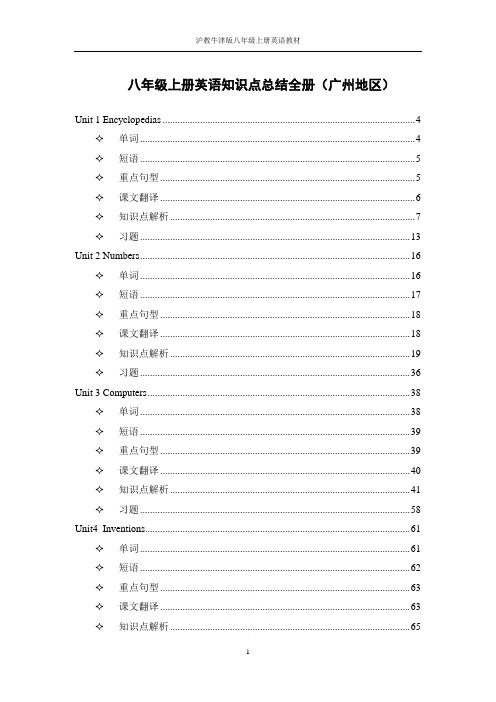
八年级上册英语知识点总结全册(广州地区)Unit 1 Encyclopedias (4)✧单词 (4)✧短语 (5)✧重点句型 (5)✧课文翻译 (6)✧知识点解析 (7)✧习题 (13)Unit 2 Numbers (16)✧单词 (16)✧短语 (17)✧重点句型 (18)✧课文翻译 (18)✧知识点解析 (19)✧习题 (36)Unit 3 Computers (38)✧单词 (38)✧短语 (39)✧重点句型 (39)✧课文翻译 (40)✧知识点解析 (41)✧习题 (58)Unit4 Inventions (61)✧单词 (61)✧短语 (62)✧重点句型 (63)✧课文翻译 (63)✧知识点解析 (65)✧习题 (68)Unit5 Educational exchange (71)✧单词 (71)✧短语 (72)✧重点句型 (72)✧课文翻译 (73)✧知识点解析 (74)✧习题 (83)Unit 6 Ancient stories (85)✧单词 (85)✧短语 (87)✧重点句型 (87)✧课文翻译 (88)✧知识点解析 (89)✧习题 (95)Unit 7 Memory (100)✧单词 (100)✧短语 (101)✧重点句型 (101)✧课文翻译 (102)✧知识点解析 (103)✧习题 (109)Unit 8 English Week (114)✧单词 (114)✧短语 (115)✧重点句型 (115)✧课文翻译 (116)✧知识点解析 (117)✧习题 (122)每单元必考语法点预览Unit 1 some与any的用法& 复合不定代词somebody, anybody, nobody等的用法Unit 2基数词及数字的表达& 序数词Unit 3形容词的比较级与最高级Unit 4 good, bad, far & (not) as…as…Unit 5现在完成时& already, yet, ever, neverUnit 6 现在完成时中since, for & 现在完成时与一般过去时的区别Unit 7(真实性)条件状语从句& if…not 与unlessUnit 8情态动词should, had betterUnit 1 Encyclopedias 单词suddenly adv. [ˈsʌdn:lɪ] 意外地,忽然地nobody pron. [ˈnoˌ bədi] 没有人,无人fossil n. [ˈfɑsəl] 化石win v [wɪn] 获胜,赢dollar n [ˈdɑlɚ] 美元✧短语1.in the countryside 在乡村,在农村11.for example 例如2.human being 人12.next to 紧挨着3.die out 灭绝,消失13.look up 查阅4.find out 了解,弄清14.live on Earth 生活在地球上5.go for a walk 去散步15.an Italian painter 一位意大利画家6.be born 出生ed to do sth 过去常常做某事7.more than 多于,超过17.at the end of 在…末尾8.just like 正如,正像18.in the centre 在中心9.how long 多久e out of…从…出来10.would like 想要20.be famous for 以…而闻名✧重点句型1.Some dinosaurs were as small as chickens. 有的恐龙和鸡一样小。
沪教牛津版英语八年级上册知识点一览表

现在完成时时态
introduce...to...、come over(to...)
6 Ancient stories
单元标题
P81-96
ancient、Trojan、war、understand、difference、pyramid、captain、Greek、capture、soldier、huge、pull 1.since、for 与现在完成
1.条件状语从句 (if/unless) 2.主现从现/主将从现
speech、notice、competition、treasure、text、chance、confidently、topic、winner、advise、several、 1.情态动词should的学习及
P113-128 opinion、whole、suggestion、communicate、whenever、rich、poor、hide、attack、shy、else、choose、
Educational exchanges
P49-64
advertisement、funny、create、telephone、wheel、comfortable、carriage、century、passenger、invent、 1.不规则变化 practical、since、distance、mobile phone、anytime、develop、lamp、candle、daytime、dust、special、 (good/well,good and
P17-32
chessboard、double 、 amount、rest 、gold、instead、realize、copy、correctly、 traffic 、accident 、a long
广州专用(沪教牛津版)八年级英语(上册)主要知识点汇总

八年级英语(上册)主要知识点Unit 1 Newspaperseful phrases andexpressionsTake charge of 主管,掌管Vote for …投赞成票Take note 记录Be responsible for 负责,有责任Talk ....over 详谈Make a list of .....把…列成清单Be free for (someone) 对(某人)免费Pay....for 付费Make a decision about.... 对…作出决定In one week's time 一周后A copy of 一份For free 免费From the air 从空中Of one's own 某人自己的Have the habit of.... 有…的习惯Try one's best 尽力Try to (do something) 尽力(做某事)Try doing something 尝试做某事Believe in oneself 相信自己Once a week 每周一次Be pleased with.... 对…满意Keep fit 保持健康Have a high fever 发高烧At break 课间休息Not at all 一点也不,完全不Get on well 相处得好For this reason 因为这样2.语法language: should and ought to (positive)should not and ought not to (negative)3.辨析3.1Other, the other, another(1) Other 表示泛指,没有特定的围。
E.g. Lei Feng always helped other people.(2) The other 意为“另一个”,一般用于两者之间。
其句型为:one...the other...(一个…另一个…)E.g. The old man has two sons. One is a soldier, the other is a worker.(3) another 表示三者或者三者以上的其他任何一个。
八年级上英语知识点沪教版
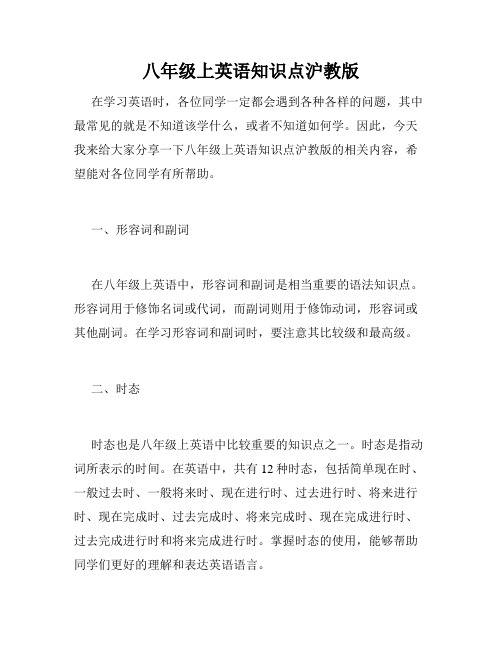
八年级上英语知识点沪教版在学习英语时,各位同学一定都会遇到各种各样的问题,其中最常见的就是不知道该学什么,或者不知道如何学。
因此,今天我来给大家分享一下八年级上英语知识点沪教版的相关内容,希望能对各位同学有所帮助。
一、形容词和副词在八年级上英语中,形容词和副词是相当重要的语法知识点。
形容词用于修饰名词或代词,而副词则用于修饰动词,形容词或其他副词。
在学习形容词和副词时,要注意其比较级和最高级。
二、时态时态也是八年级上英语中比较重要的知识点之一。
时态是指动词所表示的时间。
在英语中,共有12种时态,包括简单现在时、一般过去时、一般将来时、现在进行时、过去进行时、将来进行时、现在完成时、过去完成时、将来完成时、现在完成进行时、过去完成进行时和将来完成进行时。
掌握时态的使用,能够帮助同学们更好的理解和表达英语语言。
三、非谓语动词在八年级上英语中,非谓语动词指的是不带有时态和人称变化的动词形式。
包括不定式、动名词和分词。
非谓语动词在句子中通常用作状语或定语。
在学习非谓语动词时,要注意其用法和区别。
四、被动语态被动语态也是八年级上英语中比较重要的知识点之一。
被动语态是指动作的承受者或者对象位于句子的主语位置,而动作的执行者或者主语位于被动语态的后面。
在英语中,被动语态常用于强调动作的对象或着力说明主语背后的动作。
掌握被动语态,有利于同学们更好的理解英语中的句子结构。
五、情态动词情态动词是八年级上英语中比较难的知识点之一。
情态动词是指表示说话人的意愿、想法、建议、命令等语气和态度的动词。
包括can、could、may、might、shall、should、will、would、must 等。
在学习情态动词时,要注意其用法和意义。
六、虚拟语气虚拟语气是八年级上英语中比较难的语法知识之一。
虚拟语气指的是在条件句或者引导词为“as if”或“as though”时,用来表达假设或者愿望的语气。
在学习虚拟语气时,要注意其用法和条件从句的构成。
广州沪教牛津版英语八年级上册Unit-6-Ancient-stories知识点讲解

Unit 6 Ancient stories一、常考短语(Be) full of 有大量的,有许多的act out 将……表演出来Make jokes about 拿……开玩笑except for 除……之外In the end 最后come on 快,加油,加把劲二、经典句型1、They quietly climbed out of the horse one by one.他们一个个悄悄地从木马里爬出来。
2、Only a few people know about this information.只有少数人知道这个消息。
3、I have not laughed like this since my children.我从小就没有这样笑过。
三、课文要点讲解1、ancient 形容词,This is an ancient city.这是一座古城。
古老的,古代的The ancients 古代人2、war 可数名词,战争Peace 和平3、Understand the differences between the present perfect tense and the simple past tense.理解现在完成时与一般过去时态的差别。
①understand(understood;understood)理解,明白,懂得Do you understand English? 你懂英语吗?I can’t understand what you said. 我不明白你说什么。
练习:Speak slowly,Mr. Wang.I can’t you.A、understandB、hearC、listenD、expect②difference 可数名词,意为“差别,不同之处”常用结构the difference(s) between …and…Can you tell me the differences between them?你能告诉我他们之间的区别吗?【拓展】different 形容词,意为“不同的”常用短语 be different from 意为“与……不同”City life is different from country life.城市生活与乡村生活不同。
牛津上海版英语八上各单元知识点

牛津上海版英语八上各单元知识梳理Unit 1 PenfriendsⅠWords:1.penfriend 笔友pen pal2.magazine 杂志a literary magazine 文学杂志women’s magazine 妇女杂志→n. magazinist 期刊编辑3.hobby 业余爱好4.chess 国际象棋chessman 棋子(pl. chessmen) chessboard 棋盘5.own 拥有own up 承认错误owner 所有者物主业主6.good/well—better---best7.architect 建筑师architecture 建筑学8.nearby adv. 在附近不远adj. 附近的邻近的9.keen adj. 热心的渴望的敏锐的灵敏的Keenly adv.敏锐地keenness n. 敏锐10.ambition 雄心抱负be full of ambition 野心勃勃ambitious adj. 有雄心的11.enclose 附上Ⅱ Phrases1.at the end 在………的末端2.be keen on 热心于做热衷于………3.play chess 下象棋4.twelve years old5. a boy called Tom 一个名叫Tom 的男孩a boy named Tom a boy with the name Tom6.best wishes 最好的祝愿7.by +交通工具= take +a/an +交通工具8.tell sb. about sth. 告诉某人关于某事tell sb. to do sth. 告诉某人做某事tell sb. not to do sth. 告诉某人别做某事9.enjoy doing sth. 喜欢做某事like doing sth.mind /practice/finish/10.speak /tell /say/talksay 说述说speak 说话发言电话来时用speaking talk 说谈话of/about tell 告诉讲述Ⅲ Sentence1.make it +adj. for sb. to do sth. it 形式宾语2.sth. +be+ to do 动词不定式做表语3.I hope you will write to me soon . 我希望你尽快给我回信hope 有可能实现的愿望wish 不大可能实现的愿望hope to do 希望做某事wish sb. to do 希望某人做……..ⅣGrammarⅠquestion words (疑问词)what、who(whom) / whose/which/when/where/how/whyhow many/much/long/far/soon/fast/often/ how many timesⅡ冠词1.不定冠词a/an的用法“不见“原因”(发元音)别施“恩”(an)特殊案例:前需要加a 的:university a usual book Europe 欧洲European欧洲人one-day trip 需要加an 的:unhappy + n. uncle unusual + n.2. 定冠词the的用法特指双方熟悉,上文已经提起。
沪教牛津版初二上册英语知识点总结全册含习题和答案
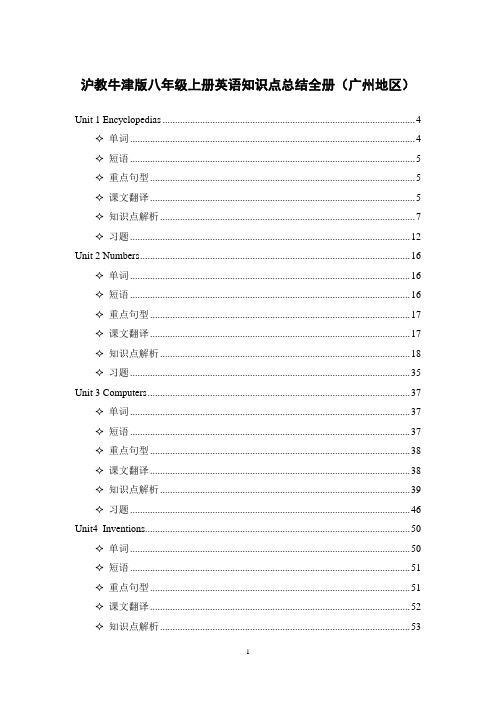
沪教牛津版八年级上册英语知识点总结全册(广州地区)Unit 1 Encyclopedias (4)✧ 单词 (4)✧ 短语 (5)✧ 重点句型 (5)✧ 课文翻译 (5)✧ 知识点解析 (7)✧ 习题 (12)Unit 2 Numbers (16)✧ 单词 (16)✧ 短语 (16)✧ 重点句型 (17)✧ 课文翻译 (17)✧ 知识点解析 (18)✧ 习题 (35)Unit 3 Computers (37)✧ 单词 (37)✧ 短语 (37)✧ 重点句型 (38)✧ 课文翻译 (38)✧ 知识点解析 (39)✧ 习题 (46)Unit4 Inventions (50)✧ 单词 (50)✧ 短语 (51)✧ 重点句型 (51)✧ 课文翻译 (52)✧ 知识点解析 (53)✧ 习题 (56)Unit5 Educational exchange (59)✧ 单词 (59)✧ 短语 (59)✧ 重点句型 (60)✧ 课文翻译 (61)✧ 知识点解析 (62)✧ 习题 (70)Unit 6 Ancient stories (73)✧ 单词 (73)✧ 短语 (74)✧ 重点句型 (74)✧ 课文翻译 (75)✧ 知识点解析 (76)✧ 习题 (81)Unit 7 Memory (86)✧ 单词 (86)✧ 短语 (87)✧ 重点句型 (88)✧ 课文翻译 (88)✧ 知识点解析 (89)✧ 习题 (96)Unit 8 English Week (100)✧ 单词 (100)✧ 短语 (101)✧ 重点句型 (101)✧ 课文翻译 (101)✧ 知识点解析 (103)✧ 习题 (107)每单元必考语法点预览Unit 1 some与any的用法& 复合不定代词somebody, anybody, nobody等的用法Unit 2基数词及数字的表达& 序数词Unit 3形容词的比较级与最高级Unit 4 good, bad, far & (not) as…as…Unit 5现在完成时& already, yet, ever, neverUnit 6 现在完成时中since, for & 现在完成时与一般过去时的区别Unit 7(真实性)条件状语从句& if…not 与unlessUnit 8情态动词should, had betterUnit 1 Encyclopedias 单词✧短语✧重点句型1.Some dinosaurs were as small as chickens. 有的恐龙和鸡一样小。
八年级沪教版英语上知识点
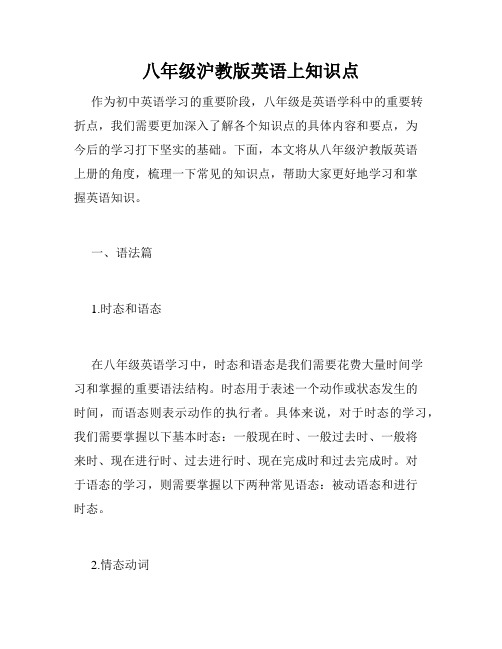
八年级沪教版英语上知识点作为初中英语学习的重要阶段,八年级是英语学科中的重要转折点,我们需要更加深入了解各个知识点的具体内容和要点,为今后的学习打下坚实的基础。
下面,本文将从八年级沪教版英语上册的角度,梳理一下常见的知识点,帮助大家更好地学习和掌握英语知识。
一、语法篇1.时态和语态在八年级英语学习中,时态和语态是我们需要花费大量时间学习和掌握的重要语法结构。
时态用于表述一个动作或状态发生的时间,而语态则表示动作的执行者。
具体来说,对于时态的学习,我们需要掌握以下基本时态:一般现在时、一般过去时、一般将来时、现在进行时、过去进行时、现在完成时和过去完成时。
对于语态的学习,则需要掌握以下两种常见语态:被动语态和进行时态。
2.情态动词情态动词是英语语法中的一个重要结构,表示主语的情感、态度、习惯等。
在八年级英语学习中,我们需要掌握情态动词的用法以及和不同时态的搭配。
常见的情态动词包括Can、Could、May、Might、Should等。
3.虚拟语气虚拟语气是用来表达虚构、假设的语气,包括三种形式:与现在事实相反的虚拟语气、与过去事实相反的虚拟语气和对未来的虚拟语气。
学习这一知识点需要掌握相应的语法结构和形式,例如:If+主语+动词的过去式,从句用would/should/could+动词原形。
二、阅读篇1.阅读理解阅读理解是英语学科中的重要一部分,需要仔细阅读并理解各种语言表达方式和信息。
在八年级英语学习中,我们需要通过多种途径提高阅读理解的能力,包括增加词汇量、熟悉各种语法结构和提高阅读速度等。
同时,通过多种阅读方式和阅读策略的运用,例如:扫读、略读、详读等,提高阅读理解的效果。
2.阅读技巧阅读技巧在英语学习中引起重视,对于学生的提高语言能力、提高阅读理解水平有着重要的作用。
学生可以通过多种途径提高自己的阅读技巧,例如:大量阅读、拓展写作、注重字词语义、练习听说读写等等。
三、词汇篇1.词汇量词汇量是英语学习中的一项非常关键的内容。
牛津8上知识点总结

牛津8上知识点总结在牛津英语8上册中,我们学习了许多英语知识,包括语法、词汇、阅读理解、写作等方面。
下面将对牛津英语8上册的知识点进行总结,希望对同学们的学习有所帮助。
1. 语法知识在牛津英语8上册中,我们学习了许多语法知识,包括名词、动词、形容词、副词、代词、冠词、介词、连词等。
其中,名词的单数和复数形式、不可数名词、名词所有格、专有名词的用法等是比较重要的知识点;动词的变位、时态、语态、情态动词、动词不定式等也需要我们认真掌握;形容词和副词的比较级和最高级、形容词和副词的修饰位置等也是需要我们注意的知识点。
2. 词汇知识在牛津英语8上册中,我们学习了大量的词汇,包括常用单词、短语、固定搭配等。
这些词汇涉及到日常生活、学习、娱乐、社交等方方面面,需要我们通过不断地积累和记忆,才能更好地掌握和运用。
3. 听力训练在学习英语过程中,听力训练是至关重要的一环。
在牛津英语8上册中,我们不仅学习了听力材料中所包含的语法和词汇知识,还锻炼了听力理解和应对听力考试的能力。
通过反复练习,我们可以提高自己的听力水平,更好地理解和运用英语。
4. 阅读理解阅读理解是我们学习英语的一个重要方面。
在牛津英语8上册中,我们学习了不少阅读材料,涉及到各种主题和文体。
通过阅读理解,我们不仅可以巩固和运用所学的语法和词汇知识,还可以提高自己的阅读能力和理解能力,从而更好地掌握和运用英语。
5. 写作能力写作是我们学习英语的一个重要技能。
在牛津英语8上册中,我们学习了叙事、说明、议论等不同类型的写作。
通过反复练习,我们可以提高自己的写作水平,更好地表达自己的思想和观点,从而更好地运用英语。
在总结上述知识点的基础上,我们还需要不断反复练习,积累更多的语言材料,不断提升自己的语言能力和思维能力。
相信在老师的指导和帮助下,我们一定可以更好地掌握和运用英语。
祝愿大家在学习英语的道路上取得更加优异的成绩!。
广州专用(沪教牛津版)八年级英语上册主要知识点

广州专用(沪教牛津版)八年级英语上册主要知识点Unit 1: NewspapersXXX source of n for many people。
They provide news。
ns。
and entertainment。
Many people have the habit of reading the newspaper every day to keep up with current events.XXX。
They must try their best to provide the readers with quality content.When writing an article。
it is important to take note of all the relevant n。
It's also important to try to present the n in an XXX for an article that is well-written and informative.XXX a list of goals and working towards them can help a XXX.It'XXX in the field。
This can provide XXX。
a team meeting XXX.Newspapers are often available for free in public XXX。
some XXX to access their content。
It's important to be pleased with the quality of the XXX.XXX and going for a walk during break time can help to XXX.When XXX read。
it'XXX newspapers can provide a well-XXX.In one week's time。
深圳广州沪教牛津英语初二上册知识点
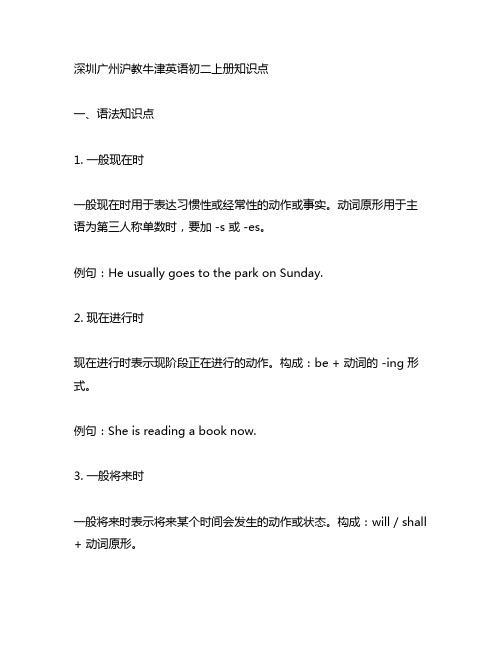
深圳广州沪教牛津英语初二上册知识点一、语法知识点1. 一般现在时一般现在时用于表达习惯性或经常性的动作或事实。
动词原形用于主语为第三人称单数时,要加 -s 或 -es。
例句:He usually goes to the park on Sunday.2. 现在进行时现在进行时表示现阶段正在进行的动作。
构成:be + 动词的 -ing 形式。
例句:She is reading a book now.3. 一般将来时一般将来时表示将来某个时间会发生的动作或状态。
构成:will / shall + 动词原形。
例句:I will visit my grandparents next week.4. have to / has tohave to / has to 表示必须做某事。
例句:I have to finish my homework before dinner. 5. mustmust 表示主观上的必须,有强烈的责任感。
例句:You must be careful when you cross the road.二、词汇知识点1. 动词短语动词短语由一个或多个动词组成,具有固定的搭配和意义。
例句:give up, go on, look after2. 形容词比较级形容词比较级用于比较两个人或事物的不同之处。
构成:原形 + er。
例句:My sister is taller than me.3. 名词复数名词复数表示多个人或事物。
构成:一般情况下在名词后加 -s;以 s, x, ch, sh 结尾的名词在后面加 -es;以辅音字母 + y 结尾的名词,变 y 为 i, 再加 -es。
例句:There are many books on the shelf.4. 形容词和副词形容词用来修饰名词,副词用来修饰动词、形容词或其他副词。
例句:She is a beautiful girl. (形容词) She sings beautifully. (副词)5. 时间状语从句时间状语从句用来表示时间。
- 1、下载文档前请自行甄别文档内容的完整性,平台不提供额外的编辑、内容补充、找答案等附加服务。
- 2、"仅部分预览"的文档,不可在线预览部分如存在完整性等问题,可反馈申请退款(可完整预览的文档不适用该条件!)。
- 3、如文档侵犯您的权益,请联系客服反馈,我们会尽快为您处理(人工客服工作时间:9:00-18:30)。
广州八年级英语(上册)主要知识点Unit 1 Newspaperseful phrases and expressions Take charge of 主管,掌管V ote for …投赞成票Take note 记录Be responsible for 负责,有责任Talk ....over 详谈Make a list of .....把…列成清单Be free for (someone) 对(某人)免费Pay....for 付费Make a decision about.... 对…作出决定In one week's time 一周后A copy of 一份For free 免费From the air 从空中Of one's own 某人自己的Have the habit of.... 有…的习惯Try one's best 尽力Try to (do something) 尽力(做某事)Try doing something 尝试做某事Believe in oneself 相信自己Once a week 每周一次Be pleased with.... 对…满意Keep fit 保持健康Have a high fever 发高烧At break 课间休息Not at all 一点也不,完全不Get on well 相处得好For this reason 因为这样2.语法language: should and ought to (positive)should not and ought not to (negative)3.辨析3.1Other, the other, another(1) Other 表示泛指,没有特定的范围。
E.g. Lei Feng always helped other people.(2) The other 意为“另一个”,一般用于两者之间。
其句型为:one...the other...(一个…另一个…)E.g. The old man has two sons. One is a soldier, the other is a worker.(3) another 表示三者或者三者以上的其他任何一个。
意为“再一;又一”。
E.g. Would you like another cup of tea?注意:the other 和other 后均可加名词,但是意思有所不同,“the other+名词”表示一定范围内出一部分外其余的全部,而"other+名词"表示出去部分以后的另一些,但不是剩下的全部。
3.2 S pend, cost, take, pay “花费”A. spend 主语必须为人,常用于一下结构:(1) spend time/money on sth. 在某物上花费时间、金钱。
E.g. I spend two hours on this maths problem.(2) spend time/ money (in) doing sth. 花费时间、金钱做某事。
E.g. They spend two years (in) doing this bridge.(3) spend money for sth. 花钱买某物E.g. His money was spent for books.B. cost 的主语是物或者某种活动,还可以表示“值”,常见的用法如下:(1) sth. cost (sb.)+金钱表示“某物花了(某人)多少钱”。
E.g. A computer costs a lot of money.(2) (doing) something cost (sb.) +时间表示“(做某事)某物花了(某人)多少时间。
”E.g. Remembering these new words cost him a lot of time.C. take 后面常跟双宾语,常见的用法如下:(1) it takes sb.+时间+ to do sth. 做某事花费了某人多少时间。
E.g. It took them three years to build this road.(2) doing sth. takes sb.+时间表示“做某事花了某人多少时间”。
E.g. Repairing this car took him the whole afternoon.D. pay 的基本用法:(1) pay (sb.) money for sth. 付钱给某人买某物。
E.g. I have to pay him two dollars for this bread.(2) pay for (sth.) 付某物的钱。
E.g. I have to pay for the lost book.(3) pay for sb. 替某人付钱。
E.g. Don't worry. I will pay for you.3.3 till, until两者都可以用作介词和连词,也都可以用于肯定句和否定句中。
Till 比until 的语气轻,一般不放在句首。
3.4 ago, before.Ago表示从现在算起一段时间“以前,”和动词的一般过去式连用。
放在所修饰词后面。
E.g. I knew him many years ago.Before用于表示从过去的某时算起若干时间以前,通常与动词的完成时连用。
E.g. I have never heard of her before.3.5 Alone 与lonelyAlone 独自一人,充当标语形容词(不作定于用)。
充当状语。
E.g. She lives alone in the house.Lonely孤独的,指心理上的愁闷。
可作表语和定语。
E.g. He doesn't fell lonely.4. 知识点拓展:4.1 agree with sb. 表示“同意某人或者某人所说的话”。
E.g. He agree with me.agree to +表示“建议,计划,办法”的词E.g. He agreed to our suggestion.agree on+ 表“具体协商的文件,计划”等E.g. We agree on the plan.agree to do sth. 同意做某事E.g. We agree to go swimming.4.2 leave 的用法:leave 作动词,表示“留下,丢下” , 英语中表示“把某物遗忘在某处”常用“leave+某物+地点”。
E.g. He left his key at home.4.3 as well as 的用法:as well as 而且,还,也as well as 可以用来连接两个相同的成分,如名词,形容词,代词,介词,此时虽然连接的是两个并列成分,但是强调的重点在前面不在后面。
意思为:“不但…而且” “既…又”, “除了…之外,还有…”。
翻译时要先译后面再译前面。
E.g. Living things need air and light as well as water. 生物不仅需要水,还需要空气和阳光。
as well as 还用于同级比较注意:as well “也”,一般用于肯定句句末,相当于"too"。
4.4 much too 与too muchm uch too “太”,副词短语。
too much “太多”形容词短语。
E.g. He felt much too tired because he has too much homework.Unit 2 detectives and crimeseful phrases and expressionsThe same ...as..和…同样的…No longer 不再Break into 强行闯入Go to jail 进监狱Instead of 代替…,而不是…Behind bars 坐牢At the back of ....在…的后部At the front of ....在前部Go in 进入室内Refuse to do sth.拒绝做某事Bump into someone/something 碰撞到某人、某物take away 带走,拿走Get away 逃离,脱身At the time of ...在…期间Say goodnight to someone 向某人道晚安Knock at 敲,击Break...down 打到From a distance 从远方,从远处In addition to 除…以外Kill oneself 自杀Lose money 输钱Be angry with someone 生某人的气2.语法Language :infinitives(动词不定式)gerunds (动名词)不定式充当句子各种成分的具体用法:2.1 不定式作主语:(1)动词不定式放在句首作主语,表示某个具体或将来的动作。
E.g. To swim in the river is dangerous.(2)在现代英语中为了平衡句子,常用it 作形式主语,而把真正作主语的不定式放在后边。
E.g. It is dangerous to swim in the river.(2)在(1)的情况下,可以用介词for 或of 来引出动词不定式的逻辑主语。
E.g. It is difficult for the foreigners to learn Chinese.2.2 不定式作宾语:(1)动词不定式可以作某些动词的宾语,表示具体的动作或行为。
E.g. I can not afford to buy a new car.(2)有些动词后既可以接不定式又可以接动名词作宾语。
但意思却不尽相同。
动名词作宾语表示经常性、习惯性,而不定式表示某次具体的活动或行为。
这样的动词有:start, begin, continue, fear, like, love 等。
I like swimming, but I don't like to swim in such a cold weather.(3)有时可以用it 作形式宾语,而把真正作宾语的动词不定式放在后面。
E.g. I find it hard to persuade her.(4)有些动词后面接不定式作宾语表示动作尚未发生,接动名词作宾语表示动作已经发生。
Remember, forget, stop, etc.2.3动词不定式作表语E.g. My job is to teach you English.2.4 动词不定式作宾语补足语动词不定式可以在某些动词后面作其宾语补足语。
